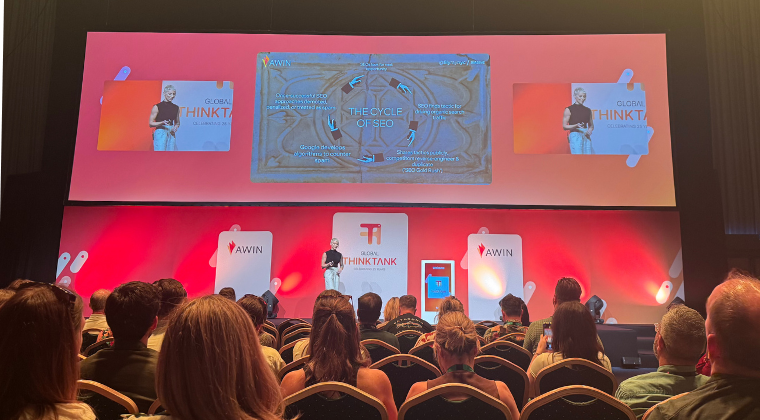Lily Ray at Awin Global ThinkTank: SEO is dead, long live SEO

If you thought SEO was just a quiet backroom discipline where nerds fiddle with metadata and whisper sweet nothings to Google’s algorithms, think again. Lily Ray – SEO expert by day, DJ and drummer by night – opened day two of Awin Global ThinkTank last week with her eye-opening predictions in light of Google’s recent unveiling of AI Mode.
Buckle up, my digital comrades. This ride gets bumpy.
The cycle of SEO doom (and gloom)
Ray kicked things off with a look back, and she’s seen every trick in the SEO book over her 15-year career: from keyword-stuffing and doorway pages to shady link-building tactics. She cleverly dubbed this predictable boom-and-bust loop the “SEO Goldrush” – a cycle in which clever SEOs find a new trick, share it at conferences like this, everyone copies it, Google notices, punishes it, and the whole thing begins anew.
The spam that ate the internet
Ray didn’t mince words when discussing what Google really thinks of SEO. Spoiler alert: it’s not always flattering. From spam updates to the famously brutal Helpful Content Update, Google has been in an all-out war against what it calls “content written for search engines.” That means thin affiliate pages, AI-generated fluff, and those dreaded “Best Running Shoes for Hamsters” lists that clutter SERPs.
If your strategy involved churning out 300 AI-powered articles about angel numbers and riddles, congrats – you’re probably already in Google’s sin bin.
Parasite SEO and the coupon catastrophe
In what might be the most gothic chapter of the modern SEO saga, Ray unpacked the phenomenon of “Parasite SEO.” We’re talking about high-authority publishers renting out their reputations to guest posters and promo code suppliers – most of it driven by third-party affiliate partnerships. The result? A wave of coupon content and product reviews that were neither transparent nor user-focused.
Google’s response? Swift and merciless. Entire swaths of content were de-indexed overnight, leaving many affiliate marketers holding nothing but broken links and broken dreams.
AI Mode and the rise of the machines
Then Ray dropped the mic on Google’s latest rollouts: AI Overviews and AI Mode. These new features are designed to keep users on Google by summarising top results into a neat AI-generated blob of information – meaning fewer clicks for publishers, and potentially the slow death of organic traffic.
The future of search might not even involve websites at all, since AI Mode results are more likely to link back to Google Business Profiles or other search results rather than your homepage.
So, what’s a marketer to do?
Despite the doomscroll-worthy vibe, Ray’s message wasn’t all despair. She pointed to bright spots – brands like TripAdvisor and product review pages that survived the purge by showcasing real-life testing and reviews of products. So her prescription? Go human or go home.
- Optimise for AI summarisation, not just keywords: Structure content with clear, concise answers to common questions, and use headings like “Pros & Cons,” or “What to Know Before Buying”.
- Invest in original research: Surveys, proprietary data, and genuine experience are gold.
- Publish real product experiences: Especially important for affiliate and review content, include original photography, video reviews, and first-person narratives.
- Get visual and social: Use YouTube, LinkedIn, Reddit and podcasts, and publish transcriptions. Large Language Models (LLMs) like ChatGPT eat this stuff up.
- Think multimodal: Repurpose content across video, Q&A, social posts, and infographics. Control your narrative and keep content consistent and up to date everywhere.
- Think in “snackable citations”: Pull key ideas from long-form assets into tweet threads, carousels, and short clips that can be individually embedded and referenced.
- Build and maintain authoritative author profiles with online footprints: LLMs tend to trust and cite people, not just brands.
- Measure visibility in LLMs: Tools like Profound and ZipTie.dev can show how often you’re cited, and the sentiment around it.
By adapting your strategy to how AI models ingest and output information, you’re not just playing the new SEO game – you’re helping write the rules.
The verdict
Ray’s keynote was a whirlwind tour through the tectonic shifts rattling the SEO industry. Her tone? Sassy, savvy, and at times sentimental. “Focus on the things search engines can’t take away from us,” she urged. Like actual expertise, meaningful content, and authenticity.
Follow Ray on LinkedIn for more takes and advice to get ahead of these seismic SEO shifts.
(We also really enjoyed her DJ set at the Bon Voyage Beach Party that evening!)
More from Awin Global ThinkTank 2025:
Dr Karen Nelson-Field: Marketers need to stop counting eyeballs and start earning them
Scott Galloway at Awin Global ThinkTank 2025: Vulgar, vital, and very much on point

Amy is intent.ly’s marketing manager, and she has 15 years’ experience working in marketing for global events and technology.
